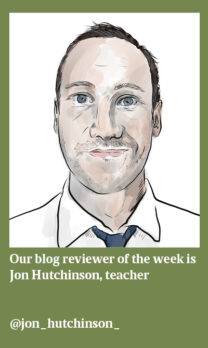Adapting to new routines, responding positively to stress, the importance of representation and tackling the word gap are Jon Hutchinson’s top picks of this week’s education topics
Teaching from behind the safety line
@teacherhead
Standing at the front of the classroom at the start of September felt like slipping on a favourite jumper; I’d missed it so much that I even gave an involuntary, beaming smile when a child responded to my instruction “Please write the date neatly on the left hand side of the page,” with, “Which side shall we write the date on?” A couple of my go-to routines are much more difficult, and sometimes impossible because of the distancing restrictions. Happily, Tom Sherrington has pulled together a number of high-impact strategies that can be implemented in Covid-restricted classrooms. It’s a snappy post, and I’ve found it so useful to have open whilst I plan to help think about what I, and the students, will be doing during lessons.
The (anti)fragility of our schools
@davidwillows
Schools are, even at the best of times, beautifully complex and volatile places. Never mind no two days, in a school no two minutes are the same. Routine and structure can tame the complexity somewhat, but you can never be quite sure what is around the corner. So, returning to classrooms with new restrictions and protocols, after 6 months of remote learning, you might think that our schools may just buckle under the additional strain. David Willows argues in this blogpost that it is possible for schools to act like a human muscle; “not only can it withstand a degree of stress, it actually benefits from it and becomes stronger as a result.” Happily, we are seeing schools across the country demonstrating this ‘antifragility’, thriving under our new circumstances. In the latter half of the blogpost, Willows offers a few practical tips to really flourish as an antifragile school.
@actionheroteach
Back in May, the murder of George Floyd prompted a worldwide conversation about anti-black racism and the role that schools need to play as anti-racist organisations. Many schools took a good hard look at, amongst other things, the curriculum that they were offering children and realised that we needed to do better. Then, at the end of August, Black Panther star Chadwick Boseman passed away aged only 43. The outpouring of grief was profound, with Boseman’s final tweet becoming the most liked post on twitter ever. In this post, Karl C Pupé reflects on the impact that Boseman had on his students and him. “I remember other kids I grew up with saying “shut-up you African” as an insult. But Chadwick & those that worked on Black Panther changed the zeitgeist bringing African colour, music & culture to billions on the planet.” Pupé’s eulogy reminds us just how much positive “representation matters”.
Covid-19 and the literacy Matthew Effect’
@HuntingEnglish
During lockdown, the vast majority of schools did their absolute level best to provide pupils with learning experiences that would allow pupils to continue to progress in their studies whilst at home. We all knew that what we were providing was sub-optimal, and that many families, through nothing but circumstance, found themselves unable to access the same level of education as others. In this blog, Alex Quigley refocuses our attention on the word gap, sometimes known as the Matthew Effect, named after the gospel passage. Quigley acknowledges that this persistent problem “preceded our Covid-19 era – and they will last far longer than the virus and its constraints on our society”. However, the lockdown would no doubt have exacerbated the disparity. After outlining the challenges, Quigley suggests “first prioritising reading for whole school literacy for the year ahead”.













Your thoughts